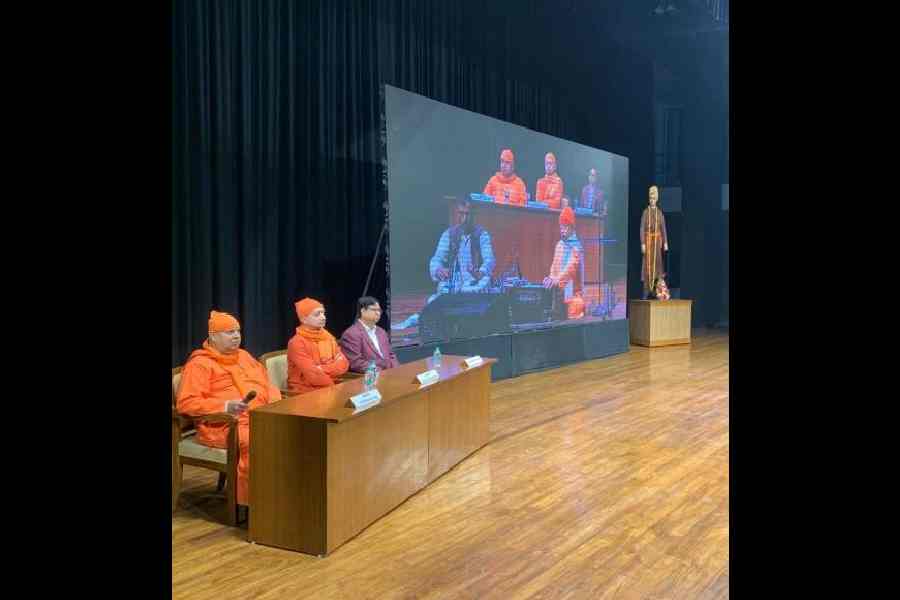An auditorium, named after Swami Vivekananda, at Viveka Tirtha hosted an interesting lecture last Sunday on the impact and significance of Swamiji’s Chicago address.
It was delivered by Swami Sarvapriyananda, the minister-in-charge of the Vedanta Society, New York.
The senior monk explained how the landmark lecture of Swami Vivekananda at the Parliament of Religions in Chicago built a bridge between the East and the West. “The accumulated treasures of India, yoga, Vedanta and other philosophical truths, flowed over that bridge to the Western world. Swami Vivekananda was the pioneer in introducing our heritage to America and eventually to the rest of the world.”
The Vedanta Society of New York and the Vedanta Society of Northern California, San Francisco were the first two centres established by Swami Vivekananda. These were followed by several other centres opened by other monks of the order. Not only monks of Ramakrishna Mission but several spiritual teachers also traveled across the bridge built by Swamiji and established centres that are flourishing.
Every other neighbourhood of New York today has yoga studios though many are not even aware of the source of yoga.
Swami Sarvapriyananda mentioned American Veda by Philip Goldberg in which the author showed how Hinduism has spread across the US and people across the society have benefitted. A chapter in the book, titled “The Swamis taught the smart guys and the smart guys taught the rest of us”, talks of eminent personalities like Aldous Huxley, Gerald Heard and Christopher Isherwood who wrote about Sri Ramakrishna and his teachings. Joseph Campbell, the renowned author of mythologies, was the disciple of Swami Nikhilananda, one of the monks of Ramakrishna Mission. He shared many ideas of Vedanta with his friend George Lucas who directed Star Wars. “Those Vedantic ideas are there in the Star Wars movies. J. D. Salinger, the novelist, said that he deliberately includes terms, Raj Yoga, Karma Yoga, JnanYoga in his work for readers to be aware of the concepts. Huston Smith, the author of The World’s Religions, was greatly influenced by Swami Vivekananda,” the monk said.
Even the spread of Buddhism in the US was to Vivekananda’s credit. On his return from the US, Swami Vivekananda’s mission was to awaken the countrymen from the slumber of colonial slavery, superstition and poverty. “He wanted to awaken the national consciousness in Indians.”
The speaker also spoke of Swami Vivekananda’s influence on Netaji and other freedom-fighters. “We are living in the world that Vivekananda created in a span of 10 years of his life.”
The harmony of religions that Swami Vivekananda spoke about in 1893 is relevant even today. “The date when Swamiji had delivered his iconic speech was unfortunately the very date, 9/11, many years later that shook the world. Behind the devastating attack was fanaticism and religious hatred.”
According to Swami Sarvapriyananda, in order to awaken religiosity in the the present generation, three things need to be followed by any spiritual organisation — stop in-fighting, stop teaching things that are against science and be updated about contemporary values. “Swami Vivekananda made friends with contemporary scientists like Nikola Tesla and William James, and brought harmony between science and religion.”
He also pointed that a big section of the American youth do not want to be associated with any religion but claim themselves to be spiritual. “This is because they object to hatred and fight in the name of religion.”
He referred to Swamiji’s motto of “acceptance not tolerance” which follows his guru Sri Ramakrishna’s view of “jato mat tato path”. “Religious teachers across the world today appreciate the liberal practices of Indian tradition carried through the ages. Swami Vivekananda’s message of accepting all religions as true has a lot of importance in today’s world as many are yet to accept that. His idea of coexistence of all religions is of utmost importance to the world today. Eeshwar, Brahman, Allah, Holy Father, Tao — called by whatever name, god is actually a limitless reality, the same reality and any one aspect of it is enough for our spiritual liberation,” he summed up.
